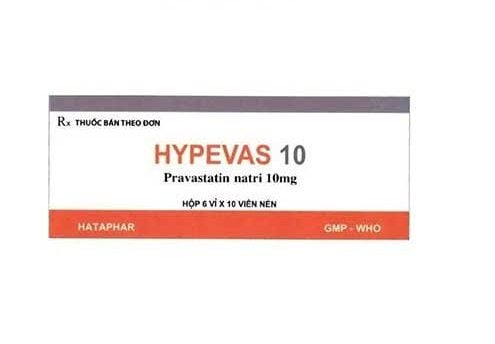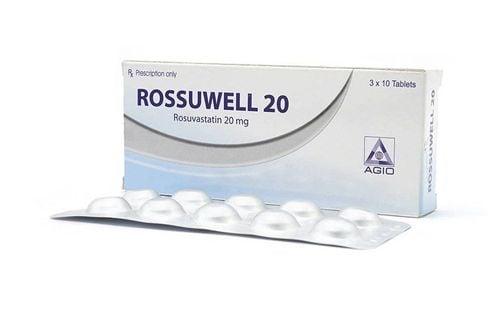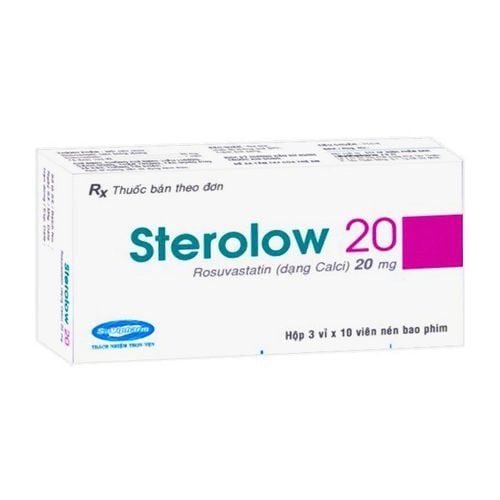This is an automatically translated article.
Rosuvastatin is a selective and competitive inhibitor of HMG-CoA which is also the main active ingredient in Devastin 20mg. So what does Devastin 20mg do?
1. What is Devastin 20mg?
The main active ingredient in the drug Devastin 20mg is Rosuvastatin calcium with the corresponding content of 20mg Rosuvastatin and the system of excipients includes: Avicel, Flowlac, Tribasic calcium phosphate, Crospovidone, Magnesium stearate, PVP, Era - tab. .. just enough 1 film coated tablet. Rosuvastatin is a selective and competitive inhibitor of HMG-CoA reductase, an enzyme that catalyzes the conversion of 3-hydroxy-3-methylglutaryl coenzyme A to mevalonate, a precursor of cholesterol.
Peak plasma concentrations of Rosuvastatin are reached approximately 5 hours after oral administration with an absolute bioavailability of approximately 20%. Approximately 90% of the dose of Rosuvastatin is eliminated unchanged in the faeces, with the remainder excreted in water. urine unchanged with a plasma half-life of approximately 19 hours. The half-life was not increased with higher doses of Rosuvastatin. The mean plasma clearance of Rosuvastatin is about 50 l/hour.
2. What are the effects of Devastin 20mg?
Devastin 20mg drug is indicated in the following cases:
Primary hypercholesterolemia (type IIa), heterozygous familial hypercholesterolemia, mixed dyslipidemia (type lIb): Devastin drug 20mg is an adjunct to diet when the patient has not responded adequately to diet and other non-pharmacological therapies (eg, exercise, weight loss) are ineffective. Homozygous familial hypercholesterolaemia: Devastin 20mg is used as an adjunct to diet and other lipid-lowering treatments (eg, LDL apheresis) or Devastin 20mg when these therapies are not appropriate. fit.
3. Dosage of Devastin 20mg
The recommended starting dose of Devastin 20mg is: Rosuvastatin 10mg, taken once a day. Most patients are controlled immediately at this initial dose. If necessary, the dose of Rosuvastatin can be increased to 20 mg after 4 weeks. Dosage increases up to 40 mg should only be used in patients with severe hypercholesterolemia who are at high risk for cardiovascular disease (especially those with familial hypercholesterolemia) but who are not meeting their goals. treated at a dose of 20 mg, it should be noted that these patients need to be monitored regularly.
Devastin 20mg can be taken at any time of the day, during or away from a meal. When Devastin 20mg is used concurrently with Atazanavir, Atazanavir + Ritonavir or Lopinavir + Ritonavir, limit the dose of active ingredient Rosuvastatin to a maximum of 10 mg once daily.
4. Contraindications of Devastin 20mg
Hypersensitivity to Rosuvastatin or any of the excipients of Devastin 20mg. Patients with active liver disease including persistent and unexplained elevations in serum transaminases, particularly when serum transaminases are elevated more than 3 times the upper limit of normal. Severe renal impairment (creatinine clearance < 30 ml/min); Patients with muscle diseases; Patient is taking Cyclosporin; Pregnant women and lactating mothers.
5. Note when using Devastin 20mg
Liver enzyme tests should be done before starting treatment with Devastin 20mg. History of muscle toxicity due to HMG-CoA reductase inhibitors (eg Devastin 20mg) or fibrates; When using Devastin 20mg at high doses, it is necessary to monitor creatine kinase (CK) because of the risk of affecting skeletal muscle. Before starting treatment with Devastin 20mg, a CK test should be performed in the following cases: Decreased renal function; Weak thyroid ; Personal or family history of hereditary muscle disease; History of myopathy due to previous statin or fibrate use; Patient history of liver disease and/or heavy alcohol consumption; Elderly patients (>70 years) with risk factors for rhabdomyolysis; Subjects with potential drug interactions; Some special patient populations should weigh the benefits/risks and monitor the patient clinically when treated with Devastin 20mg. If the CK test result is > 5 times the upper limit of normal, treatment with Devastin 20 mg should not be initiated.
During treatment with Devastin 20mg, patients need to report when there are muscle symptoms such as muscle pain, stiffness, muscle weakness... Now it is necessary to perform a CK test to take appropriate interventions. fit.
Concomitant use of Devastin 20mg with drugs to treat HIV and hepatitis C virus (HCV) may increase the risk of muscle damage, the most serious is rhabdomyolysis, kidney failure, kidney failure and may cause dead.
6. Undesirable effects of the drug Devastin 20mg
During the use of Devastin 20mg, patients may experience some side effects as follows:
Undesirable effects of Devastin 20mg are common: headache, dizziness, constipation, nausea, pain abdominal pain, pruritus, rash, urticaria, myalgia, asthenia. Undesirable effects of Devastin 20mg are rare: hypersensitivity reactions, angioedema, myopathy, rhabdomyolysis, these side effects tend to be dose dependent. In addition, Devastin 20mg also has a number of other undesirable effects including: cognitive impairment (memory loss, confusion...), increased blood sugar, increased HbA1c.
7. Interaction of Devastin 20mg with other drugs
Increased risk of muscle damage when using Devastin 20mg drug concurrently with: Gemfibrozil, fibrate blood cholesterol-lowering drugs, high-dose Niacin (>1g/day), Colchicin; Do not use Devastin 20mg with cyclosporin, vitamin K antagonists, antacids, erythromycin antibiotics, hormonal replacement contraceptive pills. Devastin 20mg tablet contains the active ingredient Rosuvastatin calcium. Devastin 20mg is indicated in cases of primary or familial hypercholesterolemia.
Follow Vinmec International General Hospital website to get more health, nutrition and beauty information to protect the health of yourself and your loved ones in your family.
Please dial HOTLINE for more information or register for an appointment HERE. Download MyVinmec app to make appointments faster and to manage your bookings easily.













